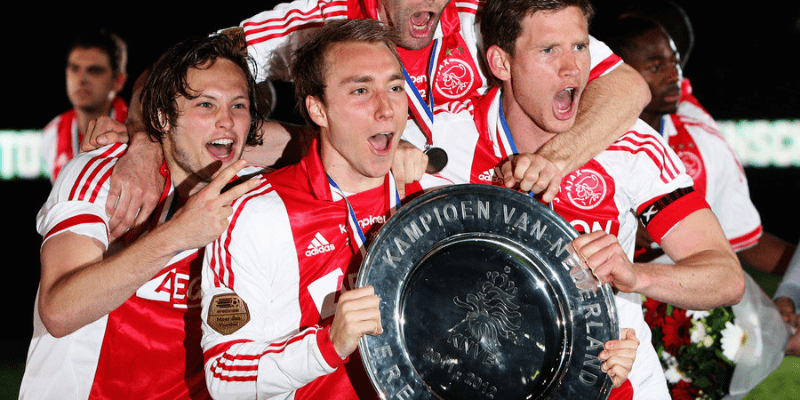When you walk into the Johan Cruijff Arena and hear the crowd chanting, “Wij zijn Ajacieden!”, you’re not just witnessing a nickname — you’re witnessing identity, history, and a linguistic tradition all wrapped into one. But why are so many fans of Ajax called Ajacieden? In this article, QuackGoal will take you on a journey through language, myth, and fan culture to uncover exactly what lies behind that distinctive name.
Origins in Classical Language and Morphology

To understand Ajacieden, we must first look at how the name Ajax transforms in Dutch morphological rules. The name Ajax comes from the legendary Greek hero Aias (or Aiác in Latin contexts) — a warrior known for his strength in Homer’s Iliad.
In Latin, such names often shift when conjugated or declined: for example, vox becomes vocis, lux becomes lucis. In the same vein, Ajax in a second-case (genitive) form can appear as Ajacis. Dutch linguists have long observed that when names ending in “x” receive suffixes, that “x” often morphs into “c” to allow more fluid combinations. This is one reason why the derivative term spells with a “c” rather than retaining the “x.”
The suffix -ied in Ajacied isn’t arbitrary either. It is linked to the Greek suffix -ides (-ίδης), meaning “son of” or “descendant of” — used in many classical names. Thus, “Ajacied” evokes a sense of being a “son of Ajax,” a poetic connection between the fan (or player) and the club’s mythological muse.
So in short: the name Ajacieden unites classical linguistic evolution, Dutch morphological rules, and a nod to ancient heritage.
Official Spelling, Variants, and Usage
While Ajacieden is considered the standard Dutch plural form, variant spellings like “Ajaxieden” also appear — especially in informal contexts. However, language authorities in the Netherlands emphasize that Ajacied / Ajacieden is the grammatically correct and accepted form.
The Dutch language advisory boards point out that the “c” spelling aligns with the Latin stem Aiac-. In practice, “Ajaxied” is seen as a nonstandard variant. The official club communications themselves frequently use Ajacieden when addressing fans or referring to them en masse.
In a club celebration marking Ajax’s 125th anniversary, they literally thanked “the Ajacieden” for their collective contributions to club history — a sign of how deeply the term is embedded in Ajax’s own identity.
From Fans to Players: Who Are The Ajacieden?

Though commonly used to refer to supporters, Ajacieden is a broader term. It encompasses:
- Fans/supporters: The legion of people following Ajax in stadiums, across the Netherlands, and worldwide
- Players and former players: Those who have worn the Ajax jersey, particularly those seen as emblematic of club history
- Members or affiliates: Club members or people closely associated with Ajax in various capacities
Thus, being an Ajacied can mean many things —.
Cultural Significance and Fan Identity

To call yourself an Ajacied is to stake a claim: to embrace belonging to one of the Netherlands’ richest football traditions. It adds emotion and collective memory to what might otherwise be a simple spectator role.
Over decades, fans have woven the term into chants, fan art, club events, and identity rituals. The word appears on scarves, banners, and in matchday rituals. When Ajax refers to its supporters — “Ajacieden”— it places fans in the narrative of the club’s legacy rather than relegating them to mere spectators.
But Ajacieden is more than a label. It’s a badge of pride, adopted with devotion, often carrying generational weight.
Controversy and Jewish Identity
An entirely separate but entwined narrative surrounds Ajax’s historical association with Jewish identity — a subject intertwined with how fans refer to themselves (and are referred to by rivals). Over time, opposing fans began taunting Ajax supporters with antisemitic chants, calling them “Joden” (Jews). Rather than reject it, many Ajax fans reclaimed the term, wearing the Star of David, chanting “Joden, Joden,” and adopting the Jewish identity as a badge of defiance.
Because of this, Ajacieden sometimes appears hand in hand with references to “de Joden” in fan culture — though most Ajacieden are not themselves Jewish. Rather, that identity was repurposed by supporters in response to antagonism, a defiant symbol of resilience.
This complex overlay of language, identity, and conflict gives the term Ajacieden greater emotional depth — it’s not just a name, but a marker of solidarity in the face of hostility.
The Role of Ajacieden in Club Culture
Atmosphere and presence in matches
The club itself frequently addresses its supporters as Ajacieden — meaning the fans are not external to the team but an embedded part of it. During events like open training days, the club uses the term to rally collective pride.
Supporters’ organizations
Ajax has formal fan organizations—such as the SVA (Supportersvereniging Ajax)—where members are known as Ajacieden. Their involvement goes beyond cheering: contributing to club decisions, organizing fan events, interpretation of traditions, and sustaining the relation between club and mass support.
Historical memory and storytelling
Every Ajacied brings personal stories—first matches attended, emotional comebacks, youth academy idols. The collective memory of victories, heartbreaks, and legends fuels the term’s meaning over generations.
Why it Matters Today
In an age when football clubs are global brands and many supporters don’t live within their city or nation, Ajacieden anchors loyalty in shared language, symbolism, and history. It is a way for fans in Helsinki, Jakarta, or Buenos Aires to claim a piece of Ajax’s narrative.
By reclaiming the club’s mythological namesake and folding in linguistic depth, Ajacieden becomes more than “supporter of Ajax” — it becomes a statement of belonging, identity, and emotional connection across generations.
Final Thoughts
Why are Ajax fans called Ajacieden? At its core, the name arises. It’s not a casual nickname — it’s a bridge connecting fans with myth, history, and one another. From its careful spelling with a “c” to its adoption in club communications and fan rituals, the term weaves culture, pride, and community into a single term QuackGoal.
In closing, why are Ajax fans called Ajacieden? Because that name captures not just who they support — but who they are. If you want to dive dee






